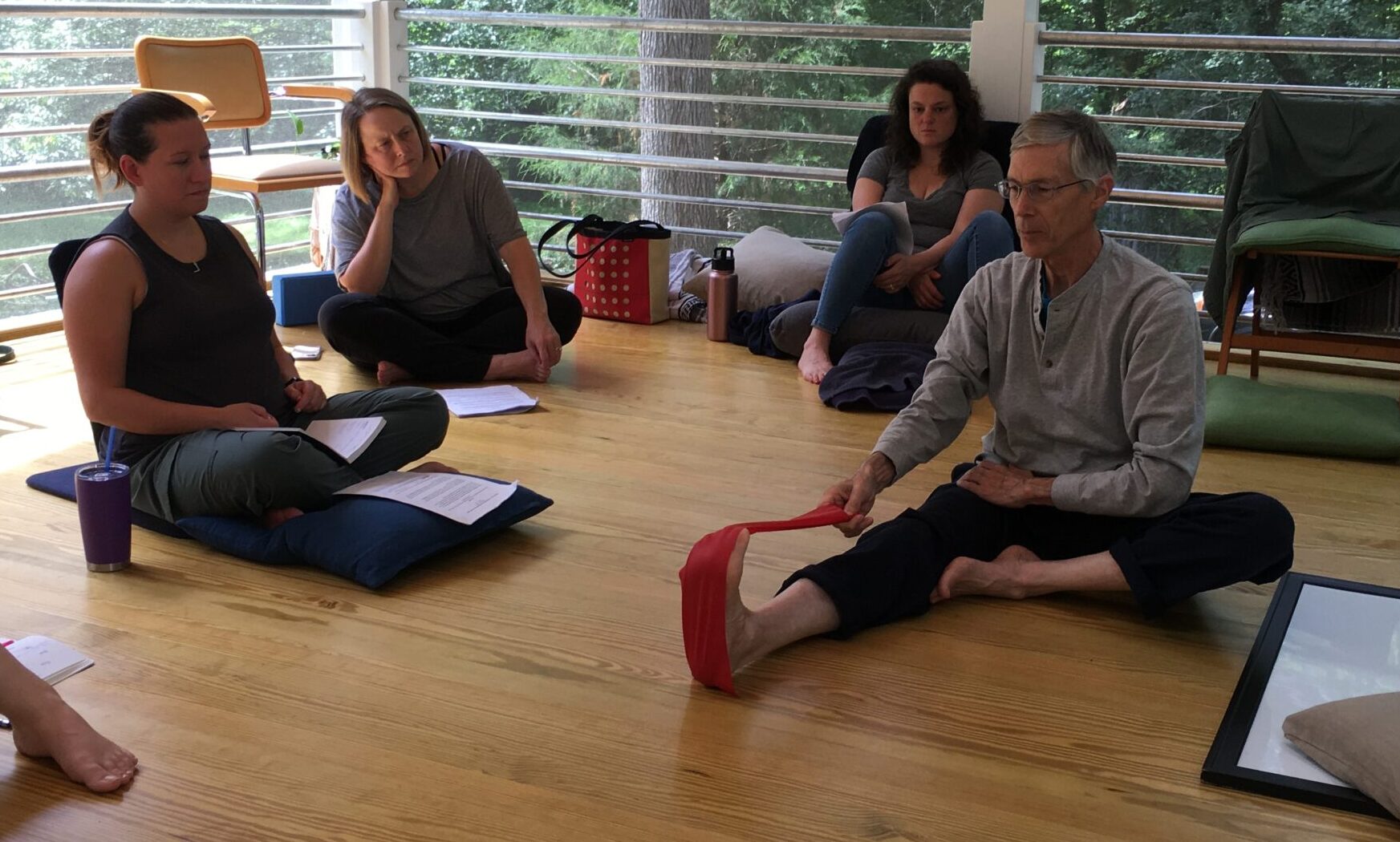Growing Seeds of Attachment-an Exploration of Somatic Tone and Primitive Reflexes is a 3.5-day experiential course integrating principles of Body-Mind Centering® and Embodied Recovery for Eating Disorders to tap into the body’s earliest and most innate capacity for movement which creates the foundation for the relational cycle of movement: yield, push, reach, grasp, pull. The inclusion of self-study helps eating disorders professionals refine their therapeutic presence, increase their capacity to co-regulate and enhance the effectiveness of assessment skills and therapeutic interventions.
PLEASE NOTE: This class is strongly experiential and includes activities that require sitting and lying on the floor as well as giving and receiving touch. You are encouraged to participate to the level of your ability and comfort. If you feel hesitation or unable to participate in any of the activities, please contact our registration administrator at registration@embodiedrecovery.org to discuss options for accommodations.
ERI welcomes people of diverse physical abilities and offers programs which are Americans with Disabilities Act (ADA) compliant. If you have requests or suggestions that would make enhance participation, please contact our registration administrator at: registration@embodiedrecovery.org
Cohorts
New cohort schedule coming soon.
For updates sign up for our newsletter.
Course Details
Description
Where does it all start?
What is our first experience of self and other?
When do we lay the foundation for our ability to connect and protect?
How do we begin to learn what it means to be in relationship?
The relational language of movement is built on our somatic tone and primitive reflexes. These movement patterns develop before and shortly after birth. They set the foundation for more complex volitional movements that connect us to safety and separate us from harm and offer bottom-up support the successful completion of the developmental tasks of embodiment, meeting needs, expressing wants, experiencing intimacy and belonging. Integrating these building blocks of movement facilitates coordination of complex actions of our everyday activities and supports nourishing relationships ourselves, each other and the world in which we live.
This course will explore the following cellular patterns and primitive reflexes:
- Simultaneous Condensing Expanding Yield
- Physiological Flexion and Extension
- Antigravity Flexion and Extension
- Autonomic Fluid Rhythm and Autonomic Fluid Tone
- Tonic Labyrinthine Reflex
- Landau
- Flexor Withdrawal Reflex
- Extensor Thrust Reflex
- Oral Rooting
- Anal Rooting
- Moro
- Babkin
- Traction Reflex
- Asymmetrical Tonic Neck Reflex
- Hand-to-Mouth Reaction
Upon completion of this class, participants will be able to:
- Define, demonstrate and facilitate 5 cellular patterns and/or primitive reflexes that provide bottom-up support for relational movement and “normative eating”.
- Identify 3 somatic indicators of unintegrated primitive reflexes which may be inhibiting “normative eating” behaviors.
- Provide psycho-physical education to clients and team members regarding the importance of addressing reflex patterning.
- Describe benefits of including Body-Mind Centering® or other reflex work in interdisciplinary treatment plan.
Agenda
Day 1: 9:00am-5:30pm
We begin by exploring cellular patterns and reflexes that develop and balancing tone. These are foundations for the relational movements of Yield and Push, the somatic scaffold for our felt sense of Belonging and Embodiment. Movements to be explored include:
- Autonomic Fluid Rhythm (AFR),
- Simultaneous Condensing Expanding Yield (SCEY)
- Physiological flexion and physiological extension
- Antigravity flexion and anti-gravity extension
Day 2: 9:00am-5:30pm
We continue our exploration of cellular patterns and reflexes which support movements of holding on and letting go. These create a foundation for relational movements of Reach and Grasp/Release, the somatic scaffold for our felt sense of Meeting Needs and Expressing Wants. Reflexes to be explored include:
Tonic Labyrinthine Reflex
Landau
Flexor Withdrawal Reflex
Extensor Thrust Reflex
Oral Rooting
Day 3: 9:00am-5:30pm
This day focuses on patterns that bring the mouth and hands together, creating the foundation for Pull and Intimacy. Reflexes to be explored include:
- Rooting Reflex
- Primitive reflexes pertaining to the horizontal plane and organizing midline; Central Focusing, Moro, Babkin, Tractioning
- Asymmetrical Tonic Neck Reflex and Hand-to-Mouth.
Day 4: 9:00am-noon
We end this course by weaving together the cellular patterns, reflexes, relational movements, and action cycle stages/barriers. We will identify how to incorporate working with these foundations into ERED approach to recovery.
Audience
The training is appropriate for all members of multidisciplinary eating disorders treatment teams including mental health professionals (Psychologist, Social Workers, Counselors, Marriage and Family Therapists, Creative Art Therapists), medical providers (MD’s, Psychiatrists, Nurses), Dietitians, Occupational Therapists, treatment program staff and adjunct providers such as yoga therapist. This training is also applicable for the same professionals who work with common co-occurring disorders such as addiction, mood disorders and trauma which arise from the same mind/body/spirit constellation that gives rise to eating disorders.
PLEASE NOTE: This class is strongly experiential and includes activities that require sitting and lying on the floor as well as giving and receiving touch. You are encouraged to participate to the level of your ability and comfort. If you feel hesitation or unable to participate in any of the activities, please contact our registration administrator at registration@embodiedrecovery.org to discuss options for accommodations.
Prerequisites
One of the following courses is required before you can take this course:
Tuition and Refund Policy
See the individual cohort listing for tuition fees.
BIPOC/LGBTQ AND STUDENT SCHOLARSHIPS : We reserve select slots in each training for reduced rate scholarships. If you would like to request a scholarship, please contact Jenn at registration@embodiedrecovery.org.
REFUND: Refund of full tuition paid minus $100 available if cancellation is made up to 6 weeks prior to start of the training. Refund of 50% of tuition paid minus $100 available if cancellation is made between 2-6 weeks prior to start of training. No refund available available if cancellation is made within 2 weeks of start of training.
Continuing Education
There are no CE’s offered for this course.

